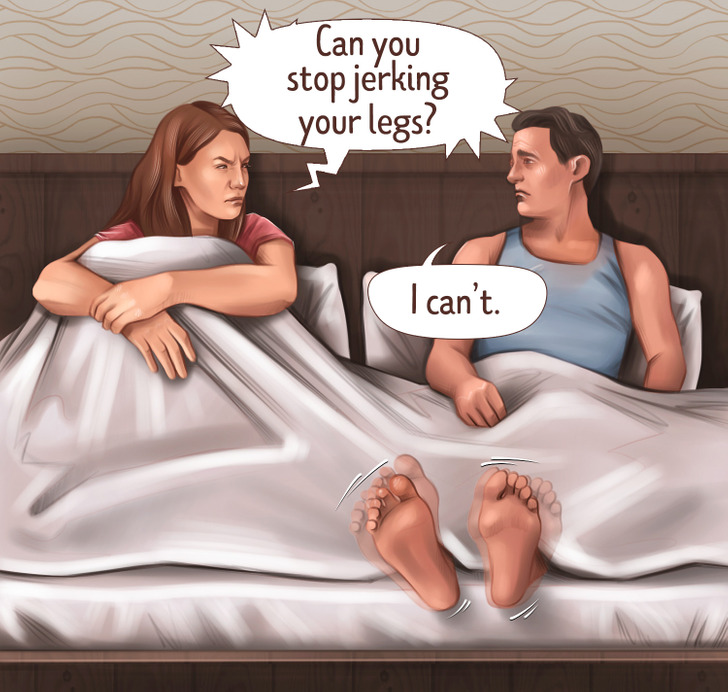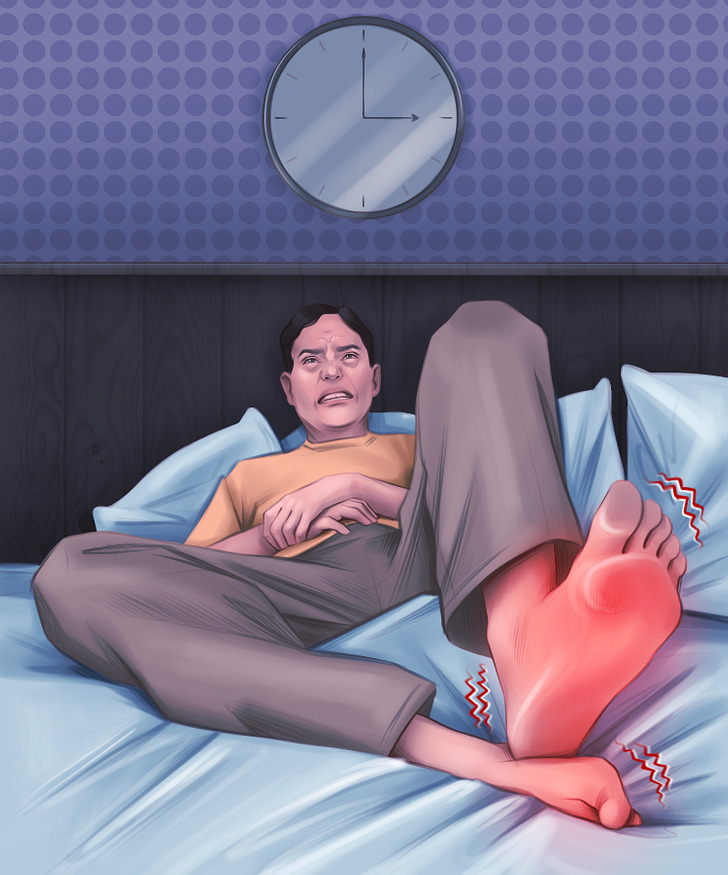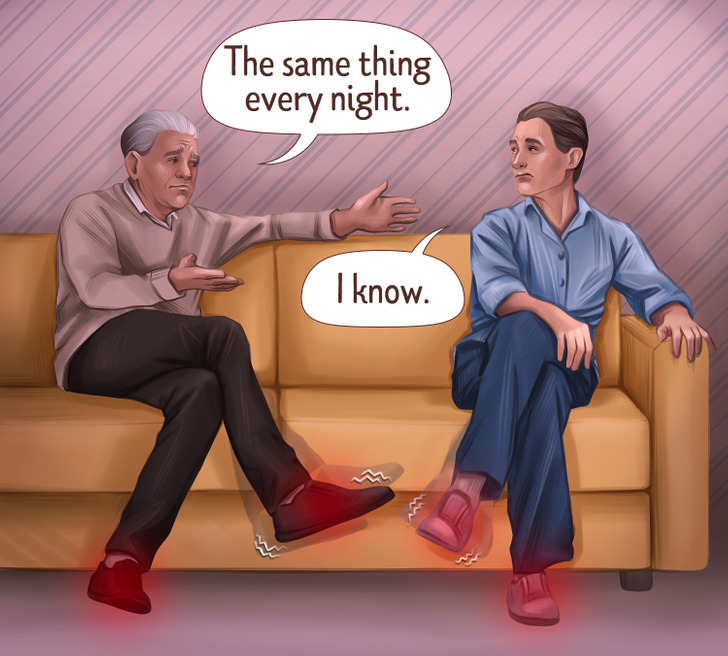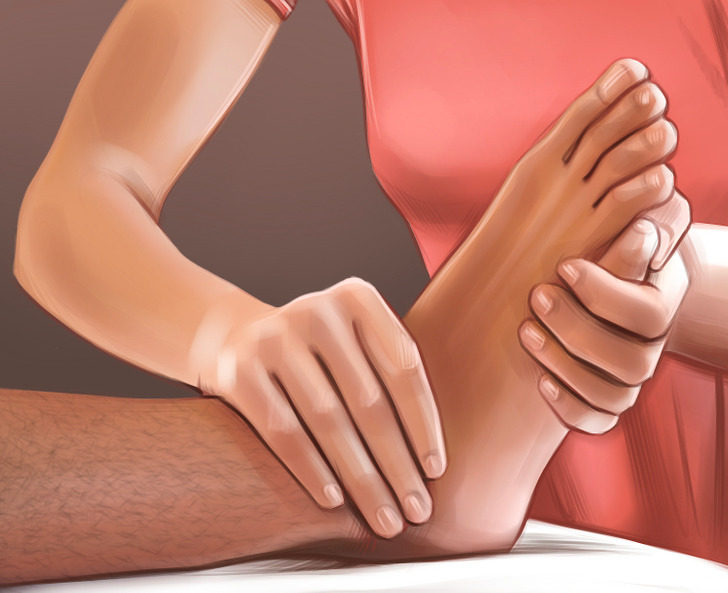What Restless Legs Syndrome Is, and Why It Causes Sleep Deprivation
If in the evening and at night you experience discomfort in your legs and an irresistible desire to constantly move them, you should read this article. If you’ve never experienced anything like this, you are quite lucky. But perhaps someone close to you has encountered this problem and could use some advice.
With 5-Minute Crafts, you’ll learn what restless legs syndrome is, and why it causes sleep deprivation.
❗ This article is for information only and can’t replace a doctor’s recommendations. Always consult a doctor in case of any health problems.
What restless legs syndrome is

Restless legs syndrome (RLS), or Willis-Ekbom disease, is a disorder that causes an overwhelming urge to move your legs. This usually happens due to discomfort in the limbs that goes away during movement.
As a rule, a person begins to feel the symptoms of RLS in the evening or at night, and it doesn’t matter whether they’re sitting or lying down. This can significantly disrupt sleep. Uncomfortable sensations almost always disappear early in the morning, so people with RLS often like to sleep at this time.
Restless legs syndrome can start at any age but it might get worse over the years. RLS is a lifelong condition, but some people go into remission and may not have symptoms for days or even years.
Symptoms of RLS

Experts identify the following symptoms of restless legs syndrome:
- You feel an overwhelming urge to move your legs, which is often accompanied by unpleasant or unusual sensations.
- The need to move the legs increases during rest.
- When you move your legs, this urge disappears partially or completely.
- The urge to move the legs starts or gets worse in the evening.
People with restless leg syndrome experience the following sensations in their legs:
- Itching
- Burning
- Creeping
- Crawling
- Aching
- Throbbing
- Tugging
Unpleasant sensations usually occur on both sides. But it happens that they appear only on the left or on the right side. It may happen that you start feeling RLS symptoms on one side, and then they move to the other side.
The symptoms of RLS range from mild to severe. They can come and go, and their intensity can change.
The causes of restless legs syndrome

There is no exact answer to the question of what causes restless leg syndrome in a particular person. However, experts have identified possible causes for the development of this condition.
- Genetics: Nearly half of the people with RLS have a family member who has it.
- Chronic diseases may include RLS symptoms:
— Iron deficiency
— Parkinson’s disease
— Kidney failure or renal disease
— Diabetes
— Peripheral neuropathy - Some medications can make RLS symptoms worse:
— Anti-nausea medications
— Antipsychotics
— Cold and allergy medications containing antihistamines - Pregnancy: Some women experience RLS during pregnancy, especially in the last trimester. Symptoms usually disappear within a month after delivery.
- Sleep problems: Lack of sleep or sleep disorders, such as sleep apnea, can cause restless legs syndrome symptoms or make them worse.
- Some foods, such as caffeine, can trigger RLS.
How to relieve RLS symptoms

Restless legs syndrome has no cure, but it can be controlled. If it’s caused by any disease, it should pass as soon as you get rid of the cause, like if you eliminate what causes your iron deficiency, for example.
To prevent RLS from interfering with your normal lifestyle, you need to relieve its symptoms. Experts recommend the following:
- Regular exercise
- Following a sleep schedule
- Avoiding caffeine
- Leg massages
- Hot baths
- Applying heating pads or ice packs to your legs
- Sleeping on a vibrating pad
- Taking medications — but medications that relieve symptoms in one person may make them worse in another. Sometimes a remedy that has been efficient for you for a while may simply stop working. In any case, medications should always be prescribed by your doctor.
Some people with RLS don’t consider it a serious condition that requires medical attention. But if the syndrome prevents you from sleeping properly and affects the quality of your life in general, you should consult a doctor.

CLICK to join a new online writing course given by 5-Minute Crafts team!